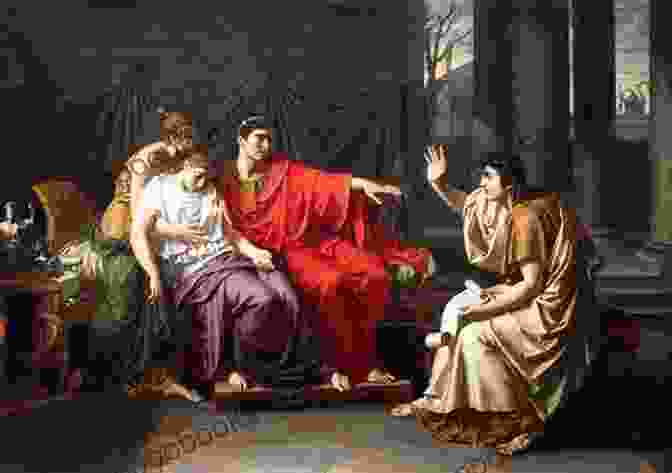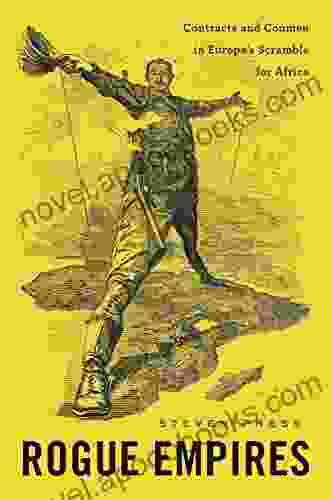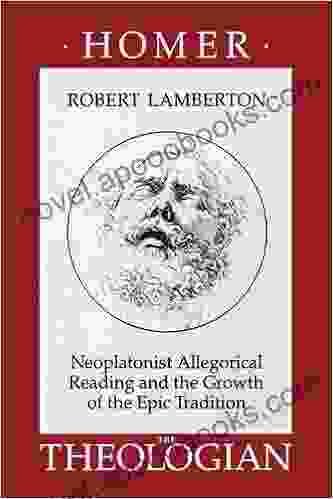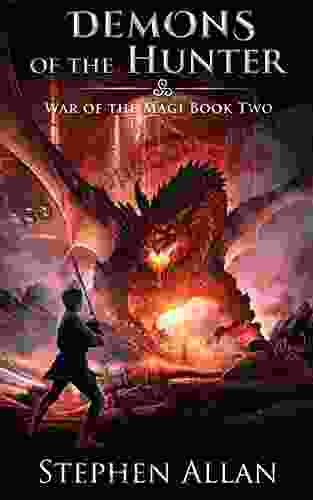Unveiling the Hidden Depths: Neoplatonist Allegorical Reading and the Rise of the Epic Tradition

The epic tradition, with its sweeping narratives, heroic characters, and profound themes, has captivated audiences throughout history. Beyond the surface level of these epic tales, however, lies a hidden layer of meaning, accessible only through the lens of Neoplatonist allegorical reading.
Neoplatonism and the Allegorical Approach
Neoplatonism, an influential philosophical school of the late antique period, believed that reality existed on multiple levels, with the material world merely a reflection of a higher, spiritual realm. This worldview led to an allegorical approach to reading, where texts were interpreted as having multiple layers of meaning, with the literal narrative representing the outermost layer.
4.7 out of 5
| Language | : | English |
| File size | : | 5445 KB |
| Text-to-Speech | : | Enabled |
| Screen Reader | : | Supported |
| Print length | : | 384 pages |
| Lending | : | Enabled |
Allegorical reading allowed readers to penetrate beyond the surface story to uncover hidden truths and insights. In this way, Neoplatonism provided a framework for unlocking the deeper significance of literary works, particularly those of the epic tradition.
Homer and the Allegorical Tradition
Homer, the legendary Greek poet, is considered the father of the epic tradition. His works, the Iliad and the Odyssey, have served as models for epic poets ever since. Neoplatonist scholars saw in Homer's epics a hidden layer of allegorical meaning.
For example, the Trojan War in the Iliad was interpreted as a symbol of the struggle between good and evil within the human soul. The characters of Achilles and Hector represented different aspects of human nature: Achilles' rage and pride symbolized the passions that lead to conflict, while Hector's nobility and courage represented the virtues that lead to harmony.
Virgil and the Roman Epic

Virgil, the Roman poet, followed in Homer's footsteps and wrote his own epic, the Aeneid. Virgil's epic tells the story of Aeneas, a Trojan hero who flees the destruction of Troy and founds a new city in Italy. Neoplatonist scholars interpreted the Aeneid as an allegory of the individual's journey towards enlightenment.
Aeneas' wanderings represented the soul's journey through the material world, while his eventual arrival in Italy symbolized the soul's return to its true home, the realm of the divine.
Dante and the Medieval Epic
In the Middle Ages, Neoplatonist allegorical reading continued to shape the development of the epic tradition. Dante Alighieri, considered one of the greatest poets of all time, wrote his epic poem, the Divine Comedy, in the 14th century.
Dante's epic is an allegorical journey through Hell, Purgatory, and Paradise. It depicts the poet's own spiritual journey and his encounter with the various realms of the afterlife. Neoplatonist scholars saw in Dante's poem a profound allegory of the soul's quest for union with God.
Milton and the Renaissance Epic
The influence of Neoplatonist allegorical reading extended into the Renaissance. John Milton, the English poet, wrote his epic poem, Paradise Lost, in the 17th century. Milton's epic tells the story of the fall of Adam and Eve from the Garden of Eden.
Neoplatonist scholars interpreted Paradise Lost as an allegory of the human soul's fall from grace and its subsequent redemption. The characters of Adam and Eve represented the human condition, while the serpent represented the temptation that leads to sin.
The Legacy of Neoplatonist Allegory
Neoplatonist allegorical reading has left an enduring legacy on the epic tradition. It provided a framework for understanding the deeper significance of epic narratives, beyond their surface stories. It influenced the interpretation and creation of epics throughout history, from Homer to Milton.
Even today, Neoplatonist allegorical reading continues to offer a valuable lens for analyzing and appreciating the richness and depth of epic literature. It allows us to uncover hidden meanings, gain new insights, and explore the timeless truths that these epics have to offer.
So, the next time you delve into an epic poem, remember the hidden depths that lie beneath the surface. With the guidance of Neoplatonist allegorical reading, you can unlock the profound truths and insights that have captivated readers for centuries.
4.7 out of 5
| Language | : | English |
| File size | : | 5445 KB |
| Text-to-Speech | : | Enabled |
| Screen Reader | : | Supported |
| Print length | : | 384 pages |
| Lending | : | Enabled |
Do you want to contribute by writing guest posts on this blog?
Please contact us and send us a resume of previous articles that you have written.
 Book
Book Novel
Novel Page
Page Chapter
Chapter Text
Text Story
Story Genre
Genre Reader
Reader Library
Library Paperback
Paperback E-book
E-book Magazine
Magazine Newspaper
Newspaper Paragraph
Paragraph Sentence
Sentence Bookmark
Bookmark Shelf
Shelf Glossary
Glossary Bibliography
Bibliography Foreword
Foreword Preface
Preface Synopsis
Synopsis Annotation
Annotation Footnote
Footnote Manuscript
Manuscript Scroll
Scroll Codex
Codex Tome
Tome Bestseller
Bestseller Classics
Classics Library card
Library card Narrative
Narrative Biography
Biography Autobiography
Autobiography Memoir
Memoir Reference
Reference Encyclopedia
Encyclopedia Scott Hershovitz
Scott Hershovitz Peter Waller
Peter Waller Oscar Dames
Oscar Dames The Book Club
The Book Club Terrence Real
Terrence Real Patricia Davids
Patricia Davids Randall Maggs
Randall Maggs Nicol C Rae
Nicol C Rae Ronit Y Stahl
Ronit Y Stahl Paolo Mancosu
Paolo Mancosu Nicole Gonzalez Van Cleve
Nicole Gonzalez Van Cleve Quintrell Baltimore
Quintrell Baltimore Valerie M Pontbriand
Valerie M Pontbriand Professor Jokasey
Professor Jokasey K Leigh
K Leigh Ellen Mccarthy
Ellen Mccarthy R L Humphries
R L Humphries Pamela Craft
Pamela Craft Nisa Santiago
Nisa Santiago Rita Arditti
Rita Arditti
Light bulbAdvertise smarter! Our strategic ad space ensures maximum exposure. Reserve your spot today!

 Willie BlairFolk Music Arrangement Of Bartok 2024: A Musical Tapestry Woven from Folklore...
Willie BlairFolk Music Arrangement Of Bartok 2024: A Musical Tapestry Woven from Folklore... Darius CoxFollow ·15.3k
Darius CoxFollow ·15.3k John UpdikeFollow ·16.5k
John UpdikeFollow ·16.5k Richard AdamsFollow ·5.2k
Richard AdamsFollow ·5.2k Donovan CarterFollow ·18.9k
Donovan CarterFollow ·18.9k Ira CoxFollow ·2.8k
Ira CoxFollow ·2.8k Fabian MitchellFollow ·15.6k
Fabian MitchellFollow ·15.6k Don ColemanFollow ·4.5k
Don ColemanFollow ·4.5k Gilbert CoxFollow ·6.1k
Gilbert CoxFollow ·6.1k

 Shaun Nelson
Shaun NelsonUnlocking the Intricate Nexus: The Globalization and the...
In an era marked by...

 Robin Powell
Robin PowellLast Summer at the Golden Hotel: A Captivating Journey of...
Synopsis: A Transformative Summer at...

 Gabriel Mistral
Gabriel MistralContracts And Conmen In Europe Scramble For Africa
The late 19th and early...

 Glenn Hayes
Glenn HayesThe Story of the United States' Longest Wildcat Strike: A...
Prologue: The...

 Evan Hayes
Evan HayesBritain Empire Resistance Repression And Revolt:...
: The Tapestry of...

 Eddie Bell
Eddie BellGreen's Operative Hand Surgery: The Ultimate Guide for...
Green's Operative Hand Surgery is the...
4.7 out of 5
| Language | : | English |
| File size | : | 5445 KB |
| Text-to-Speech | : | Enabled |
| Screen Reader | : | Supported |
| Print length | : | 384 pages |
| Lending | : | Enabled |










